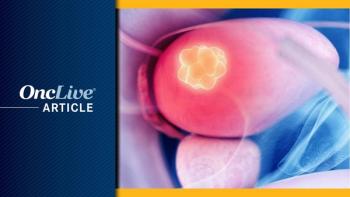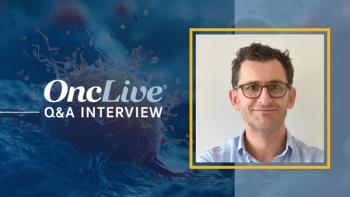
Enfortumab Vedotin/Pembrolizumab Combo, Maintenance Avelumab Continue as Gold Standards in Metastatic Urothelial Cancer

Lance C. Pagliaro, MD, highlights updated data from the JAVELIN Bladder 100 and EV-103 trials in metastatic urothelial carcinoma, discusses their relevance for navigating the expanding treatment armamentarium for this disease, and outlines several future avenues for research.
Long-term data on the efficacy of enfortumab vedotin-ejfv (Padcev) plus pembrolizumab (Keytruda) in metastatic urothelial cancer (mUC), alongside updates on the use of avelumab (Bavencio) maintenance therapy across patient subgroups, bolsters the body of evidence supporting these approaches as standards of care. It also better informs the selection of these regimens in clinical practice, according to Lance C. Pagliaro, MD.
At the
At a median follow-up of 47 months, patients (n = 45) experienced an objective response rate (ORR) of 73.3% (95% CI, 59.1%-85.4%) and a disease control rate of 84.4% (95% CI, 70.5%-93.5%). These data demonstrate the long-term efficacy and safety of this regimen, further supporting its use as a chemotherapy-free alternative in the first line.2
Additionally, an exploratory subgroup analysis of the phase 3 JAVELIN Bladder 100 trial (NCT02603432) was presented at the
“With the number of new FDA approvals that have occurred in the last 2 or 3 years, and will likely continue to occur, it's important for clinicians to be aware of the most recent data and guidelines so that patients can benefit from the most effective treatments available for their particular circumstance,” Pagliaro, who is a professor of oncology and a consultant in the Division of Medical Oncology, Department of Oncology, at Mayo Clinic in Rochester, Minnesota, said in an interview with OncLive® regarding a presentation he gave at a recent State of the Science Summit on genitourinary cancer. “That goes for both mitigating toxicity risk and preserving the best opportunity for cancer control and long-term survival.”
In the interview, Pagliaro expanded on updated findings from the JAVELIN Bladder 100 and EV-103 trials in mUC, discussed their relevance for navigating the continually expanding treatment armamentarium, and outlined several future avenues for research to address remaining unmet needs.
OncLive: Could you highlight some recent updates with treatment approaches in mUC?
Pagliaro: One [recent development is] the use of maintenance avelumab after patients achieve a response or at least stable disease with platinum-based chemotherapy. This has been standard for a couple of years. However, an updated analysis with longer follow-up was [recently] published, as well as a subgroup analysis showing that all subgroups benefited [regardless of] whether they received carboplatin or cisplatin, and whether they had a complete response or less than complete response. This further supports the role of avelumab [in mUC].
There is also [the role of] antibody-drug conjugates [ADCs], including enfortumab vedotin and sacituzumab govitecan-hziy [Trodelvy]. [We also have] recent data and the recent FDA approval of the combination of pembrolizumab and enfortumab vedotin.
What are the clinical implications of the updated efficacy and safety data from the JAVELIN Bladder 100 trial?
JAVELIN Bladder 100 was a randomized trial where patients were enrolled after achieving stable disease or better response to platinum-based chemotherapy. They were randomized to BSC alone or with avelumab maintenance. At the point of disease progression, patients on either arm could proceed with whatever salvage therapy was indicated. As expected, more of the patients on the BSC arm received an immune checkpoint inhibitor as their next line of therapy vs the patients on avelumab. The primary outcome measured was OS. A statistically significant and clinically meaningful improvement [in OS was seen with] avelumab over best supportive care.
In terms of safety, we're all familiar with the safety profile of immune checkpoint inhibitors. Different checkpoint inhibitors have similar types of toxicity and frequency. In my talk, I presented a tabulation from the updated long-term analysis about the frequency of grade 3 or greater adverse effects [AEs] at any time on avelumab, or after 12 months of avelumab for those patients who are on it for a longer period.
My general assessment is that those results were favorable compared with what you expect from immune checkpoint inhibitors. The most common grade 3 or greater AEs regardless of cause were elevated lipase and elevated amylase. The incidence of grade 3 or higher immune-related AEs was no higher than you would expect.
What key findings from the EV-103 trial supported the FDA accelerated approval of enfortumab vedotin and pembrolizumab in mUC?
EV-103 was a phase 1/2 trial of enfortumab vedotin combined with pembrolizumab for patients with mUC. There was a dose-escalation cohort. Once investigators determined the recommended dose for phase 2, they had several expansion cohorts. The data that we're talking about are derived from the dose-escalation group of patients, as well as cohort A, in which the combination [was administered to] previously untreated patients who were cisplatin ineligible. [Data were also derived from] cohort K, in which patients who were also previously untreated, and cisplatin and eligible were randomly assigned to enfortumab vedotin and pembrolizumab vs enfortumab vedotin alone. Looking at just the patients who had received pembrolizumab and enfortumab vedotin, the ORR was approximately 68%.
What is the optimal sequence of ADCs in the current treatment paradigm for patients with mUC?
As of the FDA approval of enfortumab vedotin and pembrolizumab, it is now a first-line treatment for patients with mUC who are cisplatin ineligible. Both previously approved ADCs, enfortumab vedotin and sacituzumab govitecan, are approved as second- or third-line agents after the use of an immune checkpoint inhibitor.
What unmet needs remain for patients with mUC? How could future research potentially address these needs?
Most of these treatments are still palliative for mUC. Some patients—mainly those with lymph node–only metastasis—can be cured, but there is still an urgent need for more effective treatments and better long-term outcomes. Along those lines, the number 1 [direction for future research] would be [to identify] biomarkers that would enable us to better choose a regimen from the multiple treatment options for patients.
Secondly, since ADCs appear to be quite effective for patients with urothelial carcinoma, research into new ADCs targeting novel tumor antigens is a fertile area. Since urothelial carcinoma is susceptible to immunotherapy, research into enhanced immunotherapy techniques will hopefully be relevant for patients with advanced urothelial carcinoma.
What ongoing research in mUC out of Mayo Clinic would you like to highlight?
[At Mayo Clinic], we participate in several cooperative group trials and industry-sponsored trials. One cooperative group trial in which we're currently enrolling patients is evaluating neoadjuvant chemotherapy with or without durvalumab [Imfinzi] for patients with upper tract urothelial carcinoma; this is looking at a neoadjuvant use of a checkpoint inhibitor.
References
- FDA grants accelerated approval to enfortumab vedotin-ejfv with pembrolizumab for locally advanced or metastatic urothelial carcinoma. FDA. April 3, 2023. Accessed October 6, 2023.
https://www.fda.gov/drugs/resources-information-approved-drugs/fda-grants-accelerated-approval-enfortumab-vedotin-ejfv-pembrolizumab-locally-advanced-or-metastatic - Gupta S, Rosenberg JE, McKay RR, et al. Study EV-103 dose escalation/cohort A: Long-term outcome of enfortumab vedotin + pembrolizumab in first-line (1L) cisplatin-ineligible locally advanced or metastatic urothelial carcinoma (la/mUC) with nearly 4 years of follow-up. J Clin Oncol. 2023;41(suppl):4505. doi:10.1200/JCO.2023.41.16_suppl.4505
- Valderrama B, Powles T, Sridhar S, et al. Avelumab first-line (1L) maintenance for advanced urothelial carcinoma (UC): long-term outcomes from JAVELIN Bladder 100 in subgroups defined by response to 1L chemotherapy. J Urol. 2023;209(4):e244. doi:10.1097/JU.0000000000003240.10.



































